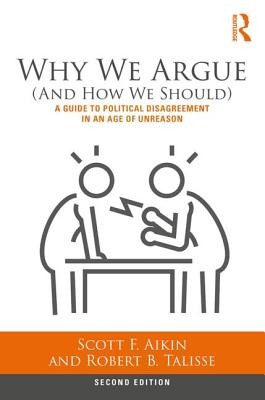
- We will send in 10–14 business days.
- Author: Scott F Aikin
- Publisher: Routledge
- ISBN-10: 1138087424
- ISBN-13: 9781138087422
- Format: 15.2 x 22.9 x 1.3 cm, softcover
- Language: English
- SAVE -10% with code: EXTRA
Reviews
Description
Why We Argue (And How We Should): A Guide to Political Disagreement in an Age of Unreason presents an accessible and engaging introduction to the theory of argument, with special emphasis on the way argument works in public political debate. The authors develop a view according to which proper argument is necessary for one's individual cognitive health; this insight is then expanded to the collective health of one's society. Proper argumentation, then, is seen to play a central role in a well-functioning democracy.
Written in a lively style and filled with examples drawn from the real world of contemporary politics, and questions following each chapter to encourage discussion, Why We Argue (And How We Should) reads like a guide for the participation in, and maintenance of, modern democracy. An excellent student resource for courses in critical thinking, political philosophy, and related fields, Why We Argue (And How We Should) is an important contribution to reasoned debate.
What's New in the Second Edition:
- Updated examples throughout the book, including examples from the 2016 U.S. election and first years of the Trump presidency;
- Expanded coverage of dialectical fallacies, including coverage of new types of fallacies and of sites where such fallacies thrive (e.g., cable news, social media);
- Revised For Further Thought questions and definitions of Key Terms, included at the end of each chapter;
- The addition of five new chapters:
- Deep Disagreement
- Argument by Analogy
- Argument between the Ads
- The Owl of Minerva (or weaponizing metalanguage)
- Argumentative Responsibility and Repair.
EXTRA 10 % discount with code: EXTRA
The promotion ends in 20d.09:25:08
The discount code is valid when purchasing from 10 €. Discounts do not stack.
- Author: Scott F Aikin
- Publisher: Routledge
- ISBN-10: 1138087424
- ISBN-13: 9781138087422
- Format: 15.2 x 22.9 x 1.3 cm, softcover
- Language: English English
Why We Argue (And How We Should): A Guide to Political Disagreement in an Age of Unreason presents an accessible and engaging introduction to the theory of argument, with special emphasis on the way argument works in public political debate. The authors develop a view according to which proper argument is necessary for one's individual cognitive health; this insight is then expanded to the collective health of one's society. Proper argumentation, then, is seen to play a central role in a well-functioning democracy.
Written in a lively style and filled with examples drawn from the real world of contemporary politics, and questions following each chapter to encourage discussion, Why We Argue (And How We Should) reads like a guide for the participation in, and maintenance of, modern democracy. An excellent student resource for courses in critical thinking, political philosophy, and related fields, Why We Argue (And How We Should) is an important contribution to reasoned debate.
What's New in the Second Edition:
- Updated examples throughout the book, including examples from the 2016 U.S. election and first years of the Trump presidency;
- Expanded coverage of dialectical fallacies, including coverage of new types of fallacies and of sites where such fallacies thrive (e.g., cable news, social media);
- Revised For Further Thought questions and definitions of Key Terms, included at the end of each chapter;
- The addition of five new chapters:
- Deep Disagreement
- Argument by Analogy
- Argument between the Ads
- The Owl of Minerva (or weaponizing metalanguage)
- Argumentative Responsibility and Repair.


Reviews